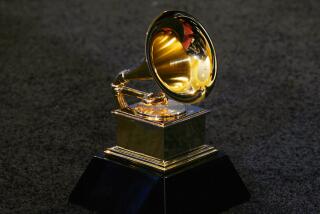Joy-Filled Show From ‘O Brother’ Artists
- Share via
NEW YORK — Few movies in recent years have made music such an integral element as “O Brother, Where Art Thou?,” Joel and Ethan Coen’s twisted take on Homer’s “The Odyssey” set in the Depression-era hard times of Mississippi in the 1930s.
The old-time music is not merely an atmospheric backdrop to the action. Drawn from country, Delta blues, bluegrass, gospel and regional variations of these genres, it was put together by the Coen brothers and music producer T Bone Burnett before the film began shooting. The soundtrack album became not just a critical success, but also a surprise commercial sensation, selling more than a million copies and topping the country chart earlier this year.
In May 2000, all the musicians from the soundtrack performed at the Ryman Auditorium in Nashville as a benefit for the Country Music Hall of Fame. Filmmaker D.A. Pennebaker’s documentary of the event, “Down From the Mountain,” is just being released, and a live recording will be out next month.
They brought the show to Carnegie Hall on Wednesday (plans are also being formed for winter dates in other cities, including Los Angeles), and the carousel of players performing solo, with their bands and with other musicians, crossing stylistic as well as generational lines, was dizzying.
With Burnett in the wings choreographing the lineup and Elvis Costello--in a subdued, awed and friendly manner--substituting as host for the recently deceased John Hartford, the joyous musical celebration came off without any glitches.
Highlights included Emmylou Harris, Alison Krauss and Gillian Welch harmonizing on the film’s “Didn’t Leave Nobody but the Baby.” Lesser-known artists including the vocal group the Fairfield Four, the bluegrass-gospel ensembles the Whites and the Cox Family, and especially the Peasall Sisters, who were clearly up way past their bedtimes, enchanted the sold-out crowd (which included an array of film people as well as the likes of Lou Reed and Laurie Anderson).
The legendary Ralph Stanley performed a chilling a cappella reading of “O Death” before the full-cast finale and acted as spiritual father for the evening’s music.
It’s telling that most of the songs performed from the soundtrack, such as “Keep on the Sunny Side” and “You Are My Sunshine,” are imbued with an indomitable spirit of joy, hope and stoic faith, from a time when America was deep in the Depression. This is not music that was made for television. It is the music ofwork days in the fields, Saturday nights at the juke joint and Sundays in church and on the front porch.
More to Read
The biggest entertainment stories
Get our big stories about Hollywood, film, television, music, arts, culture and more right in your inbox as soon as they publish.
You may occasionally receive promotional content from the Los Angeles Times.








